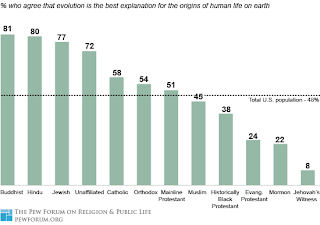This chart about says it all

This is in an article about evolution and its enemies, from the Pew Forum on Religion and Public Life(via Andrew Sullivan)
The Pew center presents some data on Sarah Palin's Real America that should make you very, very afraid:
It is interesting to me that, unlike a sad number of others, so many Buddhists embrace scientific knowledge and rejecting delusional mythological fantasies.
In a discussion on BuddhaNet about why Buddhists don't believe in god (which Pew links to), there this this series of questions and answers:

This is in an article about evolution and its enemies, from the Pew Forum on Religion and Public Life(via Andrew Sullivan)
The Pew center presents some data on Sarah Palin's Real America that should make you very, very afraid:
"Recent public opinion polls indicate that challenges to Darwinian evolution have substantial support among the American people. According to an August 2006 survey by the Pew Research Center's Forum on Religion & Public Life and the Pew Research Center for the People & the Press, 63 percent of Americans believe that humans and other animals have either always existed in their present form or have evolved over time under the guidance of a supreme being. Only 26 percent say that life evolved solely through processes such as natural selection. A similar Pew Research Center poll, released in August 2005, found that 64 percent of Americans support teaching creationism alongside evolution in the classroom."
It is interesting to me that, unlike a sad number of others, so many Buddhists embrace scientific knowledge and rejecting delusional mythological fantasies.
In a discussion on BuddhaNet about why Buddhists don't believe in god (which Pew links to), there this this series of questions and answers:
"Question:
'But if there are no gods how did the universe get here?
Answer:
All religions have myths and stories which attempt to answer this question. In ancient times, when humankind simply did not know, such myths were adequate, but in the 20th century, in the age of physics, astronomy and geology, such myths have been superseded by scientific fact. Science has explained the origin of the universe without recourse to the god-idea.
Question:
What does the Buddha say about the origin of the universe?
Answer:
It is interesting that the Buddha's explanation of the origin of the universe corresponds very closely to the scientific view. In the Aganna Sutta, the Buddha describes the universe being destroyed and then re-evolving into its present form over a period of countless millions of years. The first life formed on the surface of the water and again, over countless millions of years, evolved from simple into complex organisms. All these processes are without beginning or end and are set in motion by natural causes.
Question:
You say there is no evidence for the existence of a god. But what about miracles?
Answer:
There are many who believe that miracles are proof of god's existence. We hear wild claims that a healing has taken place but we never get an independent testimony from a medical office or a surgeon. We hear second-hand reports that someone was miraculously saved from disaster but we never get an eyewitness account of what is supposed to have happened. We hear rumors that prayer straightened a diseased body or strengthened a withered limb, but we never see X-rays or get comments from doctors or nurses. Wild claims, second-hand reports and rumors are no substitute for solid evidence and solid evidence of miracles is very rare. However, sometimes unexplained things do happen, unexpected events do occur. But our inability to explain such things does not prove the existence of gods. It only proves that our knowledge is as yet incomplete. Before the development of modern medicine, when people didn't know what caused sickness people believed that god or the gods sent diseases as a punishment. Now we know what causes such things and when we get sick, we take medicine. In time when our knowledge of the world is more complete, we will be able to understand what causes unexplained phenomena, just as we can now understand what causes disease.
Question:
But so many people believe in some form of god, it must be true.
Answer:
Not so. There was a time when everyone believed that the world was flat, but they were all wrong. The number of people who believe in an idea is no measure of the truth or falsehood of that idea. The only way we can tell whether an idea is true or not is by looking at the facts and examining the evidence.
Question:
So if Buddhists don't believe in gods, what do you believe in?
Answer:
We don't believe in a god because we believe in humanity. We believe that each human being is precious and important, that all have the potential to develop into a Buddha - a perfected human being. We believe that humans can outgrow ignorance and irrationality and see things as they really are. We believe that hatred, anger, spite and jealousy can be replaced by love, patience, generosity and kindness. We believe that all this is within the grasp of each person if they make the effort, guided and supported by fellow Buddhists and inspired by the example of the Buddha. As the Buddha says:
No one saves us but ourselves, No one can and no one may. We ourselves must walk the path, but Buddhas clearly show the way.
Dp. 165"

Comments